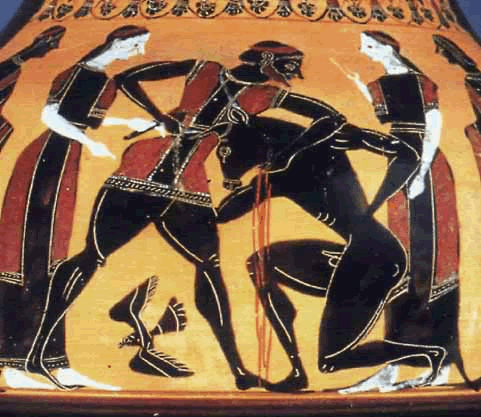![]()
Feature film - 2nd part of the "Mythica"
project

Minos, King of Crete, was the first ruler to control the Mediterranean Sea. Minos had
a famed
craftsman, Daedalus the Athenian, who was in exile from Athens because
he had murdered
his nephew. Daedalus enjoyed much favour at the court, but fell
from grace by accommodating
the queen, Pasiphaë, in a request.
Minos had boasted that the gods would grant him any wish. He made all the
preparations for
a sacrifice to Poseidon, then prayed that a bull would emerge
from
the sea. Miraculously, a
beautiful white bull swam ashore. Minos admired it so much
he decided to keep it, and sacrificed
a different one from his herd instead. This
unwise decision annoyed Poseidon, who avenged the
insult by causing queen
Pasiphaë to fall madly in love with the white bull. Her request to Daedalus
was that
he help her consummate this passion.
He did so by building an ingenious hollow wooden
cow, covered with hide and with
a door on top through which she could lower herself inside.
Together, they wheeled it
into pasture where the bull was; Daedalus helped her get in, then
discreetly withdrew.
Pasiphaë was completely satisfied, but to everyone's horror, she then
bore the Minotaur,
a creature with a man's body but a bull's head. Minos, annoyed in turn, sent
to the oracle
at Delphi to discover how he could hide this evidence of the shame to the royal family.
The oracle answered that he have Daedalus build a suitable cage - a Labyrinth - an
enormous maze,
and place the Minotaur at the centre of it. He arranged to sacrifice young
men and women to the
flesh-eating Minotaur by shutting them in the Labyrinth, where they
would wander lost, until the
Minotaur caught and devoured them.
After a fierce battle in which he fought very bravely, Androgeus (human son of King Minos)
was
killed. When Minos heard of the death of his son,he became enraged. He gathered a
great fleet
together to avenge the murder. With all of his power, Minos was unable to defeat
the Greeks until,
in exasperation, he called on the aid of Zeus to avenge Androgeus.
Greece
was hit by famine and
earthquakes , and the oracle at Delphi advised the Athenians to satisfy
any demands that Minos made
in return for peace. The demand was for a tribute of seven
youths and seven maidens to be given
every nine years, as sacrifice to the Minotaur, to which
the Athenians reluctantly agreed.
Some time after this war, king Aegeus had a son. His wife Aethra named him Theseus and
she
raised him as she had been instructed. When he was old enough, she took him to a
large rock,
to see if he could lift it. He was able to do so, and underneath he found a sword
and a pair of
sandals left for him by Aegeus. He took them, and set off for Athens.
When he
arrived, he was
nearly poisoned by Medea, who had taken refuge with Aegeus after her
various crimes in Corinth.
She had a son by Aegeus, and when she recognized who Theseus
was, she convinced Aegeus
to offer him a cup of wine laced with wolfsbane. He was just
about to drink it when Aegeus noticed
the sword that he carried, and intervened.
There was
great rejoicing in Athens, but Medea had to
flee for her life. Minos's tribute came due,
and as the ship approached, the seven youths and seven
maidens had to prepare to leave.
Theseus was so touched by the spectacle of grief that he
volunteered to lead the group himself,
promising the families of the others who would go with him
that he would bring them all back alive.
Naturally, Aegeus was not eager to allow his recently
discovered son and heir to depart on so
dangerous a task, but Theseus insisted, promising to
hoist a white sail upon his return, not the
usual black one, to signal his safe return.
Theseus and thirteen other Athenians aboard left for Crete - two of the "maidens" were actually
feminine-looking young men who could pass for girls when they dressed the part.
When they
arrived
in port, Minos himself came to see them, and threw his signet ring into the harbour,
challenging
Theseus to prove that he was the son of Poseidon by retrieving it. This task Theseus
accomplished,
aided by dolphins and Neriads. But when Theseus returned home the curse was
fulfilled, for he
forgot
to change his sail from black to white. As the ship pulled in to port, Aegeus,
seeing the black
sail,
assumed the worst, and leapt from a precipice to his death in the sea that
still bears his name.
![]()
Unizarre's "Mythica" series tries to see the classical legends from other perspectives.
Unizarre envisage
"Mythica" as being comprised of three feature films and a follow-up
TV series. Click the
following links to discover more.
![]()
![]()

